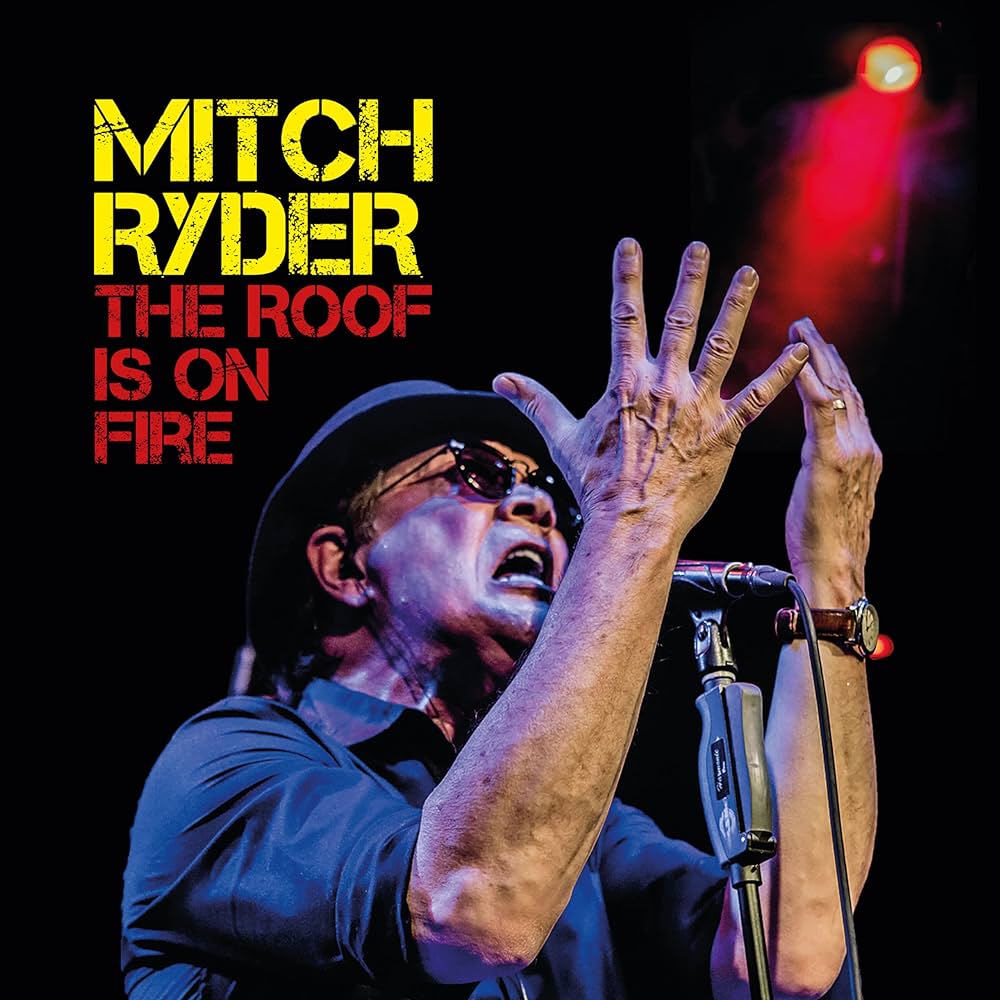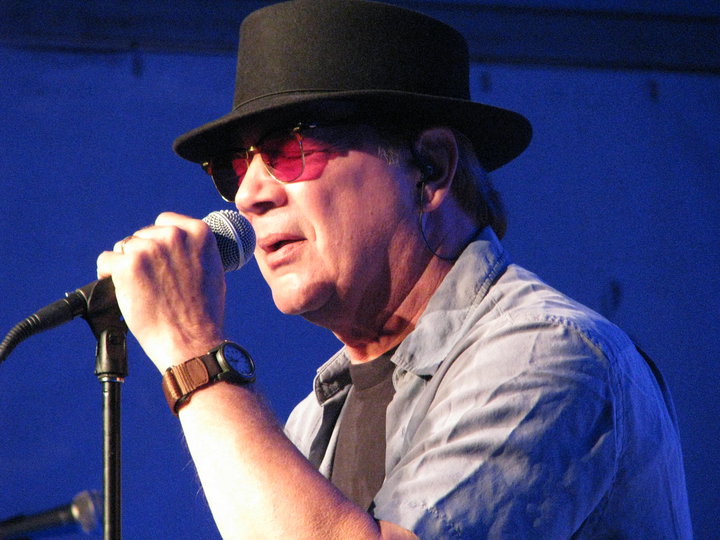Mitch Ryder in Europe has released 21 records in the six decades since his big hits “Jenny Take A Ride” and “Devil with a Blue Dress On/Good Golly Miss Molly.” In the United States, however, there are few people left alive who know who he is, that he’s still recording and regularly tours the continent. He has a new and quite contemporary album, The Roof Is on Fire, released by Ruf Records worldwide in January. Will it increase his profile in his home town Detroit? In the United States as a whole? I called him in Berlin where he’s on tour supporting the new album that was recorded at live concerts with a German band, Engerling.
“When you look at my chronological history, you come to understand there’s a very abrupt departure after the Detroit album and then certainly everything overseas to the tune of 21 different albums,” says Mitch today.

More than a decade ago, he explained the difference between European fans and American fans. “What Now My Love (1967) was the album that (manager) Bob Crewe thought was going to propel me to superstardom, and it didn’t work out that way because, while we were doing it, I was doing my R &B album here in Detroit because I was pissed off. I didn’t want to go outside of that category.
“Yet the irony is that I was free of the constraints put on me by Crewe. I found myself over in Europe where for the first time I walk into a studio, and I’m looking for somebody to tell me what the rules are, and they’re saying, ‘Okay, it’s all yours.’ And I go, ‘What did you mean?’ They say, ‘Well, do what you do! Do what you’re gonna do.’ So, there were no restraints, and suddenly I could try everything I ever wanted to try from show tunes to whatever, and it became a very eclectic sort of reputation that people began following and expecting.
“In Europe in general they do art in a different way. It has some meaning to them, and if they pick you as an artist that they admire, they love following your career in total. They love hearing the mistakes and seeing the triumphs, enjoying and getting pleasure from the struggle. For them it’s not just about the music, but it’s about the human behind the music.
“Over here (in the United States) you can have hit songs, and you can mention the name of a song, and people will remember the name of that song before they’ll remember the name of the artist that did it. It’s just two different ways of viewing our cultural history. They believe it’s something that should be maintained, and we look at it as disposable like, ‘Okay, I hate that one. What’s next?’ It’s like going to McDonald’s and trying out the new burger. We live in a disposable society, and that includes our history, and that’s why we have a lot of revisionist history going on here because we want to make things still palatable after their due date is up. It’s really a strange difference in cultures.”
The question becomes whether or not the American music lover has matured enough to accept Mitch – and his new album The Roof Is on Fire – as the artist he’s been for 21 albums, an eclectic singer/songwriter. “I do two-hour shows. It’s like I’ve created two different audiences, and it’s kinda fun. It’s schizoid I know to talk about it, but in practice it’s really important to my demographic here and there. It’s rewarding to be able to keep recording whenever I can and doing music of my own choice which is the real payoff. (That’s) a perfect world.”
At 79, is this his swan song? I don’t think he’s done yet. Hell, he doesn’t even have a bucket list. In 2014 he told me, “I’m just waiting for the shoe to drop because they announced on TV that the average lifespan of the American male is 79. I’m going, ‘Gee, I’ve only got nine years to go.’ There’s nothing wrong with me. I don’t look cool, and my skin isn’t tight, but what is that all about? That’s not about the way I feel. I’m not out trying to pick up chicks. I’m trying to enjoy my life and practice my art.”
So, is this a conscious decision on his part to combine those two worlds on this album and to introduce his American audience to your more eclectic material that he’s always done in Europe? This isn’t the first time he’s tried to make it back to the top in the United States, but now he’s found Ruf, a recording company in Germany that’s releasing the same album in the United States. “Ten years ago, we attempted to do that, but it didn’t succeed. We’ve done a lot of material since then.”
Detroit in the ’60s was colorblind. The Motown artists, Aretha Franklin, Bettye LaVette, Bob Seger, The MC5, and Mitch Ryder all brought their own creativity that mixed pop sensibilities with a funky get-down sound. Mitch cut his teeth with black artists before he ever topped the hit parade. How important was that to his creativity?
“That’s what I did to (bring) myself to the black community. When I got to New York and became successful, a lot of people were telling me, ‘Hey, you’re great. You’ve got that R&B thing down. You sound like a black guy. Da, da, da, on and on.’ Everybody was very conscious of that aspect of my ability whereas for me the Detroit Wheels (the band that recorded his biggest hits in 1965) was a very good fit. It was something that hadn’t been done, musically done, and it’s still going unrecognized as such.”
Today, he says he doesn’t have a bucket list, “but I do have things I want to do. If I don’t get to them, I’ll get to them the day after.”
If he could do it all over again, what would he do differently? Would he have picked Bob Crewe as his manager? “Well, it could be anybody. My priorities were exactly where they shouldn’t have been. I’d pick a different accountant. I would sing somewhere under a different name because I was doing it in Detroit, you know. You learn not to care, particularly after 10 years,” he says with a laugh.
The Roof Is on Fire is an eclectic double album by an artist who can rock out with the same energy he had in 1965, but here are also mid-tempo songs and live versions of material he’s recorded over the years in Europe. The cuts include Dylan’s “Subterranean Homesick Blues,” The Fabulous Thunderbirds’ “Tuff Enuff,” The Stones’ “Heart of Stone,” a radio hit “Ain’t Nobody White,” and songs most of us outside the continent haven’t heard: “From A Buick 6,” “Freezin’ in Hell,” “All The Fools It Sees,” “ If You Need The Pain,” Many River To Cross, and “Tough Kid.” All were recorded live in 2019 and 2020 at various concerts in Germany.
Mitch is not always in Germany. “We live in Georgia — and then our four-year-old grandson developed cancer, and we had to move back to Michigan. We sold the house in Georgia. They’re building a new house for us in Michigan. It should be done by the time we finish this tour, and we’re going to be available nearby to help in whatever way we can.”


